Module2 Unit 3 Language in use. 语法课件 (共31张PPT)
文档属性
| 名称 | Module2 Unit 3 Language in use. 语法课件 (共31张PPT) |  | |
| 格式 | zip | ||
| 文件大小 | 157.2KB | ||
| 资源类型 | 教案 | ||
| 版本资源 | 外研版 | ||
| 科目 | 英语 | ||
| 更新时间 | 2022-06-05 00:07:42 | ||
图片预览

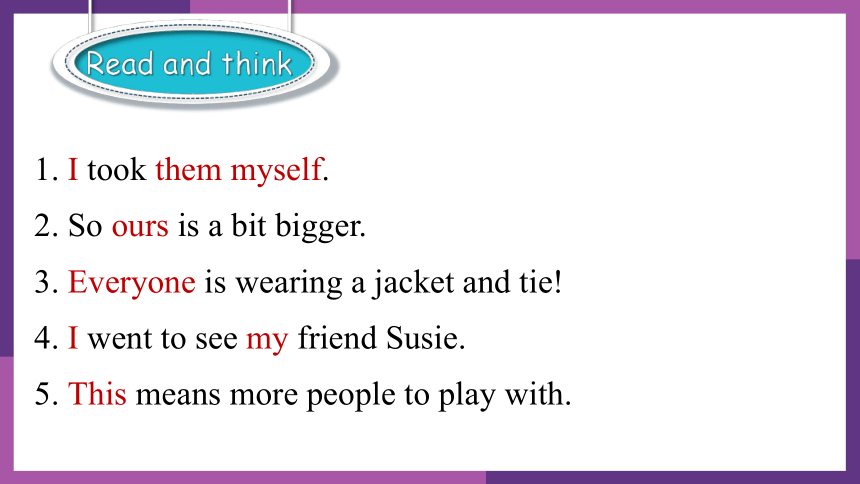
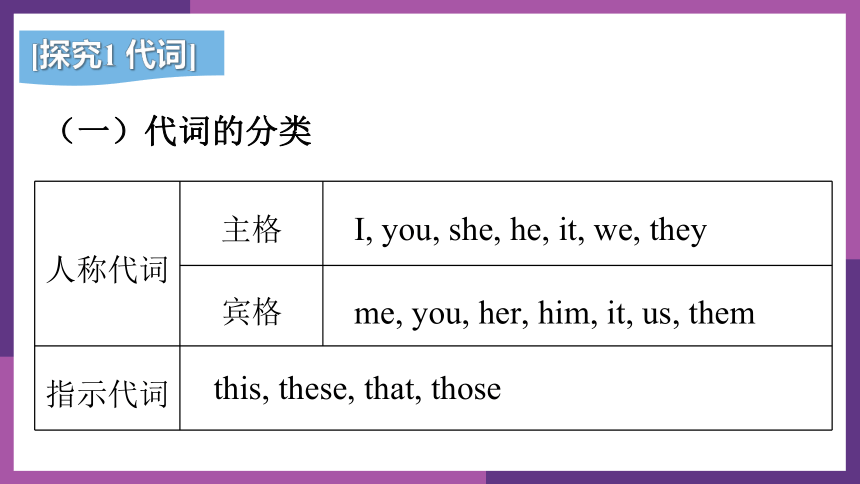
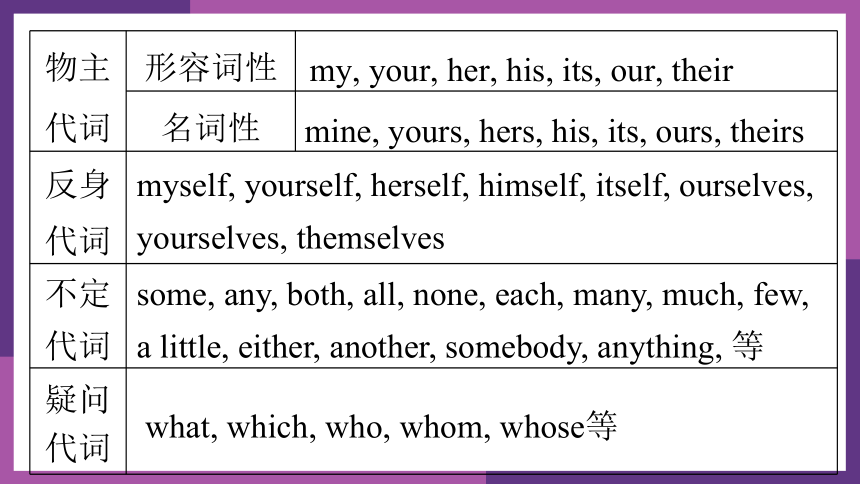
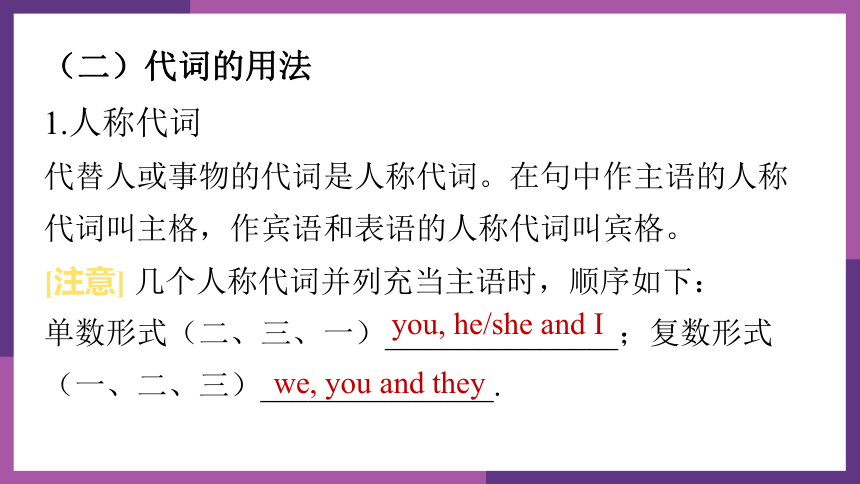
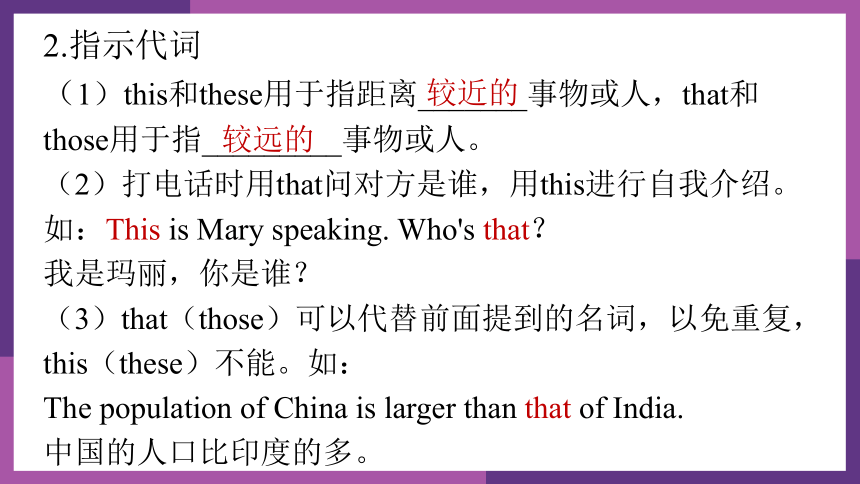
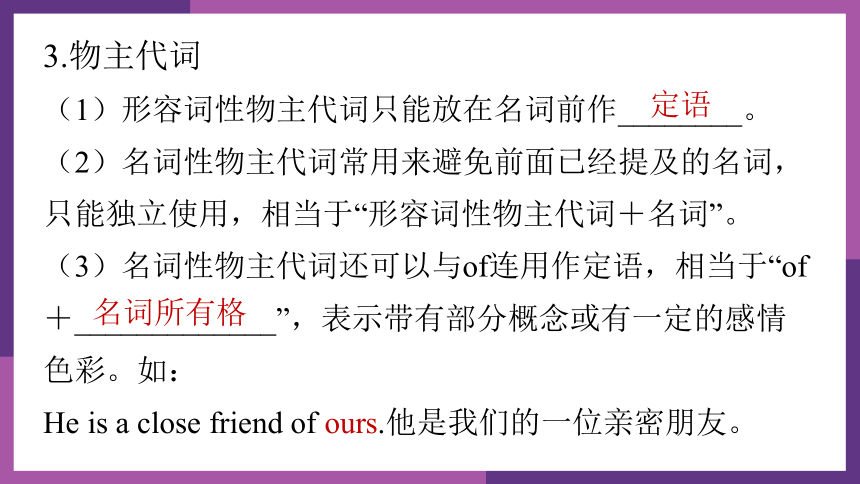
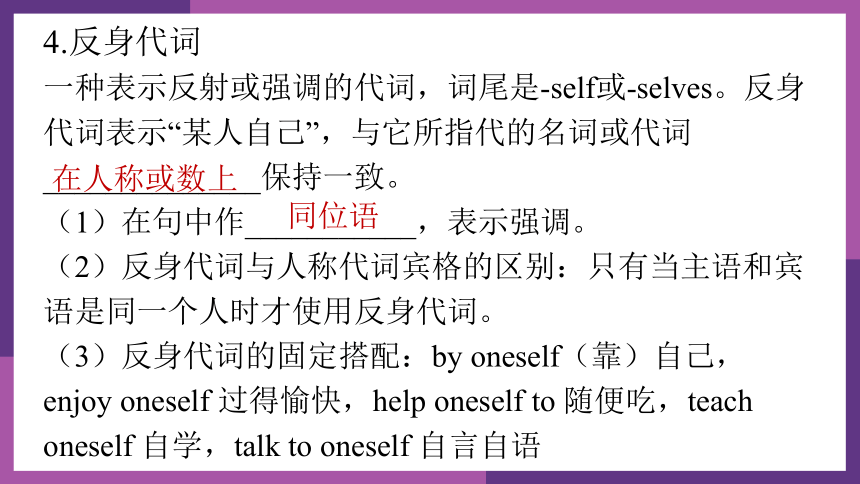
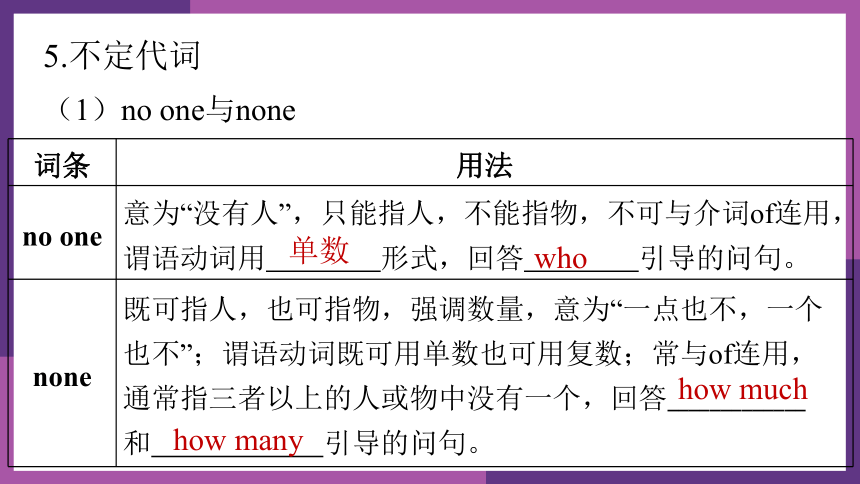
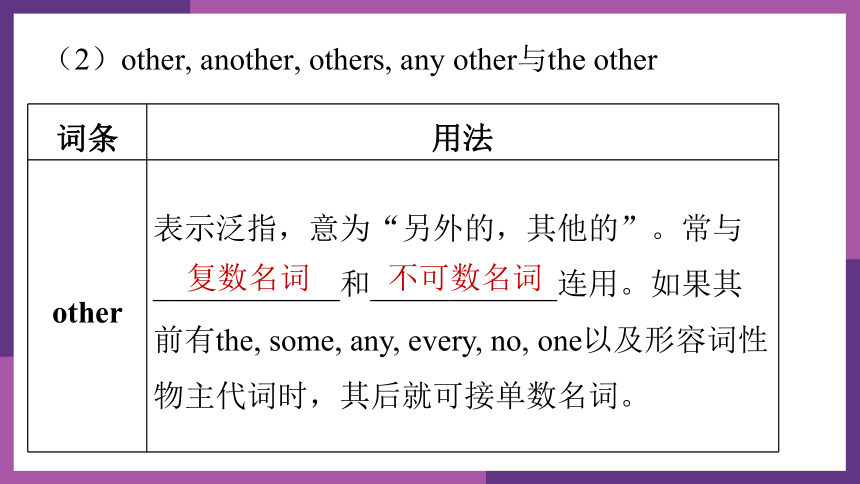

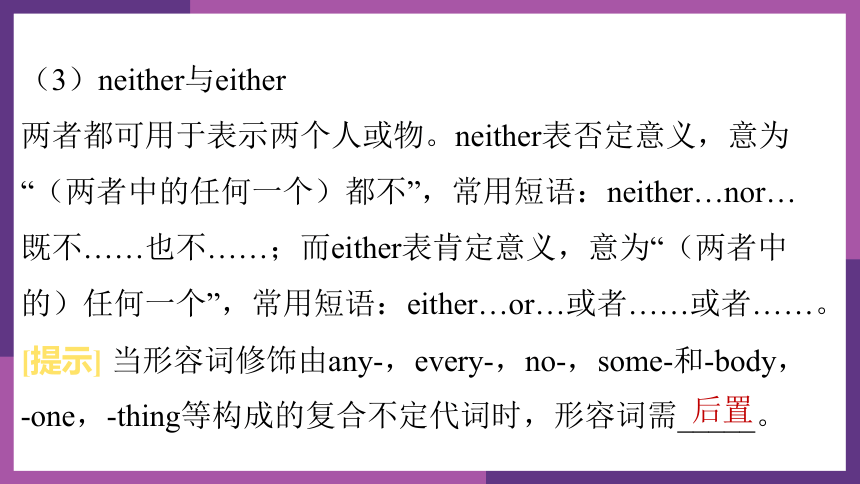
文档简介
(共31张PPT)
Unit3 Language in use
1. I took them myself.
2. So ours is a bit bigger.
3. Everyone is wearing a jacket and tie!
4. I went to see my friend Susie.
5. This means more people to play with.
Read and think
[探究1 代词]
(一)代词的分类
人称代词 主格
宾格
指示代词 I, you, she, he, it, we, they
me, you, her, him, it, us, them
this, these, that, those
物主代词 形容词性
名词性
反身代词 不定代词 疑问代词 my, your, her, his, its, our, their
mine, yours, hers, his, its, ours, theirs
myself, yourself, herself, himself, itself, ourselves, yourselves, themselves
some, any, both, all, none, each, many, much, few, a little, either, another, somebody, anything, 等
what, which, who, whom, whose等
(二)代词的用法
1.人称代词
代替人或事物的代词是人称代词。在句中作主语的人称代词叫主格,作宾语和表语的人称代词叫宾格。
[注意] 几个人称代词并列充当主语时,顺序如下:
单数形式(二、三、一)_______________;复数形式(一、二、三)_______________.
you, he/she and I
we, you and they
2.指示代词
(1)this和these用于指距离_______事物或人,that和those用于指_________事物或人。
(2)打电话时用that问对方是谁,用this进行自我介绍。如:This is Mary speaking. Who's that?
我是玛丽,你是谁?
(3)that(those)可以代替前面提到的名词,以免重复,this(these)不能。如:
The population of China is larger than that of India.
中国的人口比印度的多。
较近的
较远的
3.物主代词
(1)形容词性物主代词只能放在名词前作________。
(2)名词性物主代词常用来避免前面已经提及的名词,只能独立使用,相当于“形容词性物主代词+名词”。
(3)名词性物主代词还可以与of连用作定语,相当于“of+_____________”,表示带有部分概念或有一定的感彩。如:
He is a close friend of ours.他是我们的一位亲密朋友。
定语
名词所有格
4.反身代词
一种表示反射或强调的代词,词尾是 self或 selves。反身代词表示“某人自己”,与它所指代的名词或代词______________保持一致。
(1)在句中作___________,表示强调。
(2)反身代词与人称代词宾格的区别:只有当主语和宾语是同一个人时才使用反身代词。
(3)反身代词的固定搭配:by oneself(靠)自己, enjoy oneself 过得愉快,help oneself to 随便吃,teach oneself 自学,talk to oneself 自言自语
在人称或数上
同位语
5.不定代词
(1)no one与none
词条 用法
no one 意为“没有人”,只能指人,不能指物,不可与介词of连用,谓语动词用 形式,回答 引导的问句。
none 既可指人,也可指物,强调数量,意为“一点也不,一个也不”;谓语动词既可用单数也可用复数;常与of连用,通常指三者以上的人或物中没有一个,回答_____________ 和 引导的问句。
单数
who
how much
how many
(2)other, another, others, any other与the other
词条 用法
other 表示泛指,意为“另外的,其他的”。常与____________和____________连用。如果其前有the, some, any, every, no, one以及形容词性物主代词时,其后就可接单数名词。
复数名词
不可数名词
another 常用于指三者或三者以上的另外一个,泛指单数。可单独使用,也可后接名词。如果其后接______时,则表示“又,再,还”。
others 表示泛指,意为“别的人或物”,但不指全部。特指时在其前加定冠词;前面可加任何限定词以及数量词。
any other 表示一个之外的其他任何一个,而不是两者之中的另一个。
the other 表示两者中的另外一个。可单独使用,也可接单数名词。
基数词
(3)neither与either
两者都可用于表示两个人或物。neither表否定意义,意为“(两者中的任何一个)都不”,常用短语:neither…nor…既不……也不……;而either表肯定意义,意为“(两者中的)任何一个”,常用短语:either…or…或者……或者……。
[提示] 当形容词修饰由any ,every ,no ,some 和 body, one, thing等构成的复合不定代词时,形容词需_____。
后置
(4)it与one
it 和one都可以代替上文出现过的事物,但两者是有区别的。it往往指上文出现过的特定的事物,即“同类同一”,而one则“同类不同一”。不定代词one指代可数名词单数,既可指人又可指物,其复数形式为ones,所有格形式为one's,反身代词为oneself。
6.疑问代词
疑问代词用于构成特殊疑问句,包括what, which, who, whom, whose,代词的选择根据句意要求而定。
1
Underline the correct words.
Anna: Hi, Bob. How did your exams go last term
Bob: Great! I got good marks in (1) both/ each maths and geography. What about you
Anna: I did really well in English. That’s (2) anything/ something I’ve always enjoyed. My marks in history and art weren’t so good because (3) none/ neither is my favorite subject. What will you study this term
Bob: I’ve still got (4) a few/ few days before I have to decide. I’m going to speak to (5) both/ all my teachers and ask for their advice.
Anna: The teachers say that we must decide for (6) themselves/ ourselves and that (7) none/ neither of them can tell us what to do.
Bob: But I have to get (8) some/ any information because there are so (9) much/ many subjects and it’s very hard to choose.
2
Complete the passage with the words and expression in the box.
both each other His mine myself
A good teacher is someone who is helpful and kind, like my history teacher, Mr Miller. (1) _____ knowledge of the subject is excellent. Because of him, I love history and even read history books by (2) ______ after the lessons.
myself
His
A friend of (3) _____ called Mark also loves this subject and sometimes we lend (4) _________ books or DVDs about history. I like reading (5) _____ Western and Chinese history books, but I think Chinese history is my favorite subject.
both each other His mine myself
both
each other
mine
3
Complete the sentences with the correct form of the words in the box.
he her him himself our she
their themselves they us we
1. John’s homework is too difficult. ____ is not able to do it _______, so I’m going to help ____ with it.
2. Some people do not have time to wash _______ pets __________, so _____ pay someone to do it at the pet shop.
himself
He
him
their
themselves
they
he her him himself our she
their themselves they us we
3. —Jane is doing a project about family history. ____ has asked
us to give ____ some of ____ photos that were taken when
we were young. Have ____ got any, Betty
—Yes, there is a photo of ____ with all the children in our
family.
She
her
our
we
us
1. We go to school every weekday from 8:45 am to 3:15 pm.
2. We have a large sports ground for football and tennis, where we can play both during and after school hours.
3. I’ve been at River School, London, since I was eleven.
4. River School is a secondary school, about twenty minutes away from my home by bike.
Read and think
[探究2 介词]
(一)介词的分类
结构分类 简单介词 由一个词构成的介词
合成介词 由两个词合在一起构成的介词
介词短语 由两个或多个单词组成的起介词作用的短语
in; at; on
into; outside
next to; thanks to
意义分类 地点介词 表示空间和方位的介词
时间介词 表示时间的介词
手段介词 表示方式、方法、手段的介词
其他介词 among; beside
after; in; at
by; with
about; except; towards
(二)常见介词的用法辨析
1.表示方位的介词:in, to与on
in表示在某地范围_______;to表示在某地范围_______;on表示与某地____________。
2.表示工具或手段的介词:by, with, on与in
by后一般接交通工具或________; with表示“用某种工具”或后面接表示人体部位的名词;on表示“以……方式”,后面一般接表示电器的名词;in后一般接表示________的名词或语言。
之内
之外
相邻或接壤
动名词
材料
3. across, through, along, past
词条 含义 例句
across 意为“穿过”,强调穿过某一平面 He walked across the street carefully. 他小心地穿过街道。
through 强调从某一空间内部穿过或通过 The train ran quickly through the tunnel. 火车快速从隧道中穿过。
along 强调顺着、沿着路或河流一直前进 Walk along the street to the end.
沿着这条街走到尽头。
past 强调从某物的一旁经过 Our bus drove past the Bird Nest.
我们的公交车驶过鸟巢。
4.表示“在……上”的介词:above, over与on
1)above指“在……上方”,表示相对高度,不一定在正上方,其反义词为________;
2)over指“在……正上方”,表示垂直上方,其反义词为_______;
3)on表示“在……上面”,与物体表面接触,与beneath相对。
below
under
4
Complete the passage with the words in the box. You need to use one word more than once.
at for in on
The school cinema shows lots of foreign films. Next week (1)___ Friday and Sunday it is showing a French film called Never Say Goodbye. The story is set (2)___ Paris (3)___ the 1960s. The film lasts two hours and fifteen minutes and starts (4)___ 6:30 and 9:30 (5)___the evenings. Tickets are 5, but there is a special half-price ticket (6)____ students from our school. Please bring your student card if you want a cheap ticket.
on
in
in
at
in
for
Exercise
1. It's been 100 years since the May Fourth Movement took place________May 4, 1919.
A.for B.in C.at D.on
2.—Where would you like to go tomorrow, Beijing or Xi'an
—_______is OK. It's up to you.
A.Either B.Neither C.Both D.All
D
A
3. —Hey, Jenny, which are my gifts for Father's Day?
—The yellow gifts are __ and the red__ belong to Grandpa.
A.your; one B.yours; one
C.you; ones D.yours; ones
4. —There is ______ in Tina's WeChat shop.
—So that's why I decide to buy the present in ____ shop.
A.something special; other B.special something; the other
C.nothing special; another D.special nothing; others
D
C
用适当的介词填空
1.My family lived in England________2010 to 2015.
2.The tablecloth is used________cleaning the table.
3.There is a big bridge________the river.
4.The accident happened________23rd May, 2017.
5.Tom sits_________Mary and John.
from
for
over
on
between
GOOD JOB
Unit3 Language in use
1. I took them myself.
2. So ours is a bit bigger.
3. Everyone is wearing a jacket and tie!
4. I went to see my friend Susie.
5. This means more people to play with.
Read and think
[探究1 代词]
(一)代词的分类
人称代词 主格
宾格
指示代词 I, you, she, he, it, we, they
me, you, her, him, it, us, them
this, these, that, those
物主代词 形容词性
名词性
反身代词 不定代词 疑问代词 my, your, her, his, its, our, their
mine, yours, hers, his, its, ours, theirs
myself, yourself, herself, himself, itself, ourselves, yourselves, themselves
some, any, both, all, none, each, many, much, few, a little, either, another, somebody, anything, 等
what, which, who, whom, whose等
(二)代词的用法
1.人称代词
代替人或事物的代词是人称代词。在句中作主语的人称代词叫主格,作宾语和表语的人称代词叫宾格。
[注意] 几个人称代词并列充当主语时,顺序如下:
单数形式(二、三、一)_______________;复数形式(一、二、三)_______________.
you, he/she and I
we, you and they
2.指示代词
(1)this和these用于指距离_______事物或人,that和those用于指_________事物或人。
(2)打电话时用that问对方是谁,用this进行自我介绍。如:This is Mary speaking. Who's that?
我是玛丽,你是谁?
(3)that(those)可以代替前面提到的名词,以免重复,this(these)不能。如:
The population of China is larger than that of India.
中国的人口比印度的多。
较近的
较远的
3.物主代词
(1)形容词性物主代词只能放在名词前作________。
(2)名词性物主代词常用来避免前面已经提及的名词,只能独立使用,相当于“形容词性物主代词+名词”。
(3)名词性物主代词还可以与of连用作定语,相当于“of+_____________”,表示带有部分概念或有一定的感彩。如:
He is a close friend of ours.他是我们的一位亲密朋友。
定语
名词所有格
4.反身代词
一种表示反射或强调的代词,词尾是 self或 selves。反身代词表示“某人自己”,与它所指代的名词或代词______________保持一致。
(1)在句中作___________,表示强调。
(2)反身代词与人称代词宾格的区别:只有当主语和宾语是同一个人时才使用反身代词。
(3)反身代词的固定搭配:by oneself(靠)自己, enjoy oneself 过得愉快,help oneself to 随便吃,teach oneself 自学,talk to oneself 自言自语
在人称或数上
同位语
5.不定代词
(1)no one与none
词条 用法
no one 意为“没有人”,只能指人,不能指物,不可与介词of连用,谓语动词用 形式,回答 引导的问句。
none 既可指人,也可指物,强调数量,意为“一点也不,一个也不”;谓语动词既可用单数也可用复数;常与of连用,通常指三者以上的人或物中没有一个,回答_____________ 和 引导的问句。
单数
who
how much
how many
(2)other, another, others, any other与the other
词条 用法
other 表示泛指,意为“另外的,其他的”。常与____________和____________连用。如果其前有the, some, any, every, no, one以及形容词性物主代词时,其后就可接单数名词。
复数名词
不可数名词
another 常用于指三者或三者以上的另外一个,泛指单数。可单独使用,也可后接名词。如果其后接______时,则表示“又,再,还”。
others 表示泛指,意为“别的人或物”,但不指全部。特指时在其前加定冠词;前面可加任何限定词以及数量词。
any other 表示一个之外的其他任何一个,而不是两者之中的另一个。
the other 表示两者中的另外一个。可单独使用,也可接单数名词。
基数词
(3)neither与either
两者都可用于表示两个人或物。neither表否定意义,意为“(两者中的任何一个)都不”,常用短语:neither…nor…既不……也不……;而either表肯定意义,意为“(两者中的)任何一个”,常用短语:either…or…或者……或者……。
[提示] 当形容词修饰由any ,every ,no ,some 和 body, one, thing等构成的复合不定代词时,形容词需_____。
后置
(4)it与one
it 和one都可以代替上文出现过的事物,但两者是有区别的。it往往指上文出现过的特定的事物,即“同类同一”,而one则“同类不同一”。不定代词one指代可数名词单数,既可指人又可指物,其复数形式为ones,所有格形式为one's,反身代词为oneself。
6.疑问代词
疑问代词用于构成特殊疑问句,包括what, which, who, whom, whose,代词的选择根据句意要求而定。
1
Underline the correct words.
Anna: Hi, Bob. How did your exams go last term
Bob: Great! I got good marks in (1) both/ each maths and geography. What about you
Anna: I did really well in English. That’s (2) anything/ something I’ve always enjoyed. My marks in history and art weren’t so good because (3) none/ neither is my favorite subject. What will you study this term
Bob: I’ve still got (4) a few/ few days before I have to decide. I’m going to speak to (5) both/ all my teachers and ask for their advice.
Anna: The teachers say that we must decide for (6) themselves/ ourselves and that (7) none/ neither of them can tell us what to do.
Bob: But I have to get (8) some/ any information because there are so (9) much/ many subjects and it’s very hard to choose.
2
Complete the passage with the words and expression in the box.
both each other His mine myself
A good teacher is someone who is helpful and kind, like my history teacher, Mr Miller. (1) _____ knowledge of the subject is excellent. Because of him, I love history and even read history books by (2) ______ after the lessons.
myself
His
A friend of (3) _____ called Mark also loves this subject and sometimes we lend (4) _________ books or DVDs about history. I like reading (5) _____ Western and Chinese history books, but I think Chinese history is my favorite subject.
both each other His mine myself
both
each other
mine
3
Complete the sentences with the correct form of the words in the box.
he her him himself our she
their themselves they us we
1. John’s homework is too difficult. ____ is not able to do it _______, so I’m going to help ____ with it.
2. Some people do not have time to wash _______ pets __________, so _____ pay someone to do it at the pet shop.
himself
He
him
their
themselves
they
he her him himself our she
their themselves they us we
3. —Jane is doing a project about family history. ____ has asked
us to give ____ some of ____ photos that were taken when
we were young. Have ____ got any, Betty
—Yes, there is a photo of ____ with all the children in our
family.
She
her
our
we
us
1. We go to school every weekday from 8:45 am to 3:15 pm.
2. We have a large sports ground for football and tennis, where we can play both during and after school hours.
3. I’ve been at River School, London, since I was eleven.
4. River School is a secondary school, about twenty minutes away from my home by bike.
Read and think
[探究2 介词]
(一)介词的分类
结构分类 简单介词 由一个词构成的介词
合成介词 由两个词合在一起构成的介词
介词短语 由两个或多个单词组成的起介词作用的短语
in; at; on
into; outside
next to; thanks to
意义分类 地点介词 表示空间和方位的介词
时间介词 表示时间的介词
手段介词 表示方式、方法、手段的介词
其他介词 among; beside
after; in; at
by; with
about; except; towards
(二)常见介词的用法辨析
1.表示方位的介词:in, to与on
in表示在某地范围_______;to表示在某地范围_______;on表示与某地____________。
2.表示工具或手段的介词:by, with, on与in
by后一般接交通工具或________; with表示“用某种工具”或后面接表示人体部位的名词;on表示“以……方式”,后面一般接表示电器的名词;in后一般接表示________的名词或语言。
之内
之外
相邻或接壤
动名词
材料
3. across, through, along, past
词条 含义 例句
across 意为“穿过”,强调穿过某一平面 He walked across the street carefully. 他小心地穿过街道。
through 强调从某一空间内部穿过或通过 The train ran quickly through the tunnel. 火车快速从隧道中穿过。
along 强调顺着、沿着路或河流一直前进 Walk along the street to the end.
沿着这条街走到尽头。
past 强调从某物的一旁经过 Our bus drove past the Bird Nest.
我们的公交车驶过鸟巢。
4.表示“在……上”的介词:above, over与on
1)above指“在……上方”,表示相对高度,不一定在正上方,其反义词为________;
2)over指“在……正上方”,表示垂直上方,其反义词为_______;
3)on表示“在……上面”,与物体表面接触,与beneath相对。
below
under
4
Complete the passage with the words in the box. You need to use one word more than once.
at for in on
The school cinema shows lots of foreign films. Next week (1)___ Friday and Sunday it is showing a French film called Never Say Goodbye. The story is set (2)___ Paris (3)___ the 1960s. The film lasts two hours and fifteen minutes and starts (4)___ 6:30 and 9:30 (5)___the evenings. Tickets are 5, but there is a special half-price ticket (6)____ students from our school. Please bring your student card if you want a cheap ticket.
on
in
in
at
in
for
Exercise
1. It's been 100 years since the May Fourth Movement took place________May 4, 1919.
A.for B.in C.at D.on
2.—Where would you like to go tomorrow, Beijing or Xi'an
—_______is OK. It's up to you.
A.Either B.Neither C.Both D.All
D
A
3. —Hey, Jenny, which are my gifts for Father's Day?
—The yellow gifts are __ and the red__ belong to Grandpa.
A.your; one B.yours; one
C.you; ones D.yours; ones
4. —There is ______ in Tina's WeChat shop.
—So that's why I decide to buy the present in ____ shop.
A.something special; other B.special something; the other
C.nothing special; another D.special nothing; others
D
C
用适当的介词填空
1.My family lived in England________2010 to 2015.
2.The tablecloth is used________cleaning the table.
3.There is a big bridge________the river.
4.The accident happened________23rd May, 2017.
5.Tom sits_________Mary and John.
from
for
over
on
between
GOOD JOB
同课章节目录
- Module 1 Travel
- Unit 1 We toured the city by bus and by taxi
- Unit 2 It's a long story.
- Unit 3 Language in use
- Module 2 Education
- Unit 1 They don't sit in rows.
- Unit 2 What do I like best about school?
- Unit 3 Language in use
- Module 3 Life now and then
- Unit 1 They sometimes work harder.
- Unit 2 I think life is better today.
- Unit 3 Language in use.
- Module 4 Rules and suggestions
- Unit 1 You must be careful of falling stones.
- Unit 2 we must keep the camp clean.
- Unit 3 Language in use.
- Revison A
- Module 5 Look after yourself
- Unit 1 We'd better get you to hospital.
- Unit 2 Get off the sofa!
- Unit 3 Language in use.
- Module 6 Eating togethe
- Unit 1 When is the school-leavers' party?
- Unit 2 Knives and forks are used for most Western
- Unit 3 Language in use
- Module 7 English for you and me
- Unit 1 Have you ever been to an English corner?
- Unit 2 We all own English.
- Unit 3 Language in use
- Module 8 My future life
- Unit 1 Here's to our friendship and the future
- Unit 2 I know that you will be better at maths.
- Unit 3 Language in use
- Revison B
